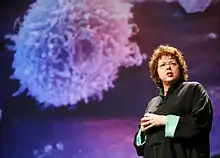Laurie Garrett
Laurie Garrett (born 1951) is an American science journalist and author. She was awarded the Pulitzer Prize for Explanatory Journalism in 1996 for a series of works published in Newsday, chronicling the Ebola virus outbreak in Zaire.[1]
Laurie Garrett | |
|---|---|
 Garrett at the 2008 Poptech conference. | |
| Born | 1951 (age 69–70) Los Angeles, California, U.S. |
| Alma mater | University of California, Santa Cruz (B.S., 1975) University of California, Berkeley (doctoral coursework) |
| Occupation | science journalist, author |
| Website | LaurieGarrett.com |
Biography
Laurie Garrett was born in Los Angeles, California, in 1951.[2] She graduated from San Marino High School in 1969.[3] She then graduated with honors from Merrill College at the University of California, Santa Cruz, where she received a B.S. in biology in 1975.[3][4] She enrolled in a Ph.D. program in the Department of Bacteriology and Immunology at the University of California, Berkeley and did research at Stanford University with Leonard Herzenberg.
During her doctoral studies, Garrett started reporting on science news for radio station KPFA. The hobby soon became far more interesting than graduate school and she took a leave of absence to explore journalism, and has never completed that degree. At KPFA, she worked in management, in news, and in radio documentary production. A documentary series she co-produced (with Adi Gevins) won the 1977 Peabody Award in Broadcasting, and other KPFA production efforts by Garrett, won the Edwin Howard Armstrong award.
In 1997, Garrett won a George Polk Award for Foreign Reporting, for "Crumbled Empire, Shattered Health" in Newsday, described as "a series of 25 articles on the public health crisis in the former Soviet Union".[5] She won another Polk award in 2000 for her book Betrayal of Trust, "a meticulously researched account of health catastrophes occurring in different places simultaneously and amounting to a disaster of global proportions".[6] In 2004, Garrett joined the Council on Foreign Relations as the Senior Fellow of the Global Health Program. She has worked on a broad variety of public health issues including SARS, avian flu, tuberculosis, malaria, shipping container clinics, and the intersection of HIV/AIDS and national security.
Garrett lives in the Brooklyn Heights district of New York City.[7]
Works
- Garrett, Laurie (2012). I Heard the Sirens Scream: How Americans Responded to the 9/11 and Anthrax Attacks. ISBN 9781469910109. Retrieved November 24, 2020.
- Garrett, Laurie (2003). Betrayal of Trust: The Collapse of Global Public Health. Oxford University Press. ISBN 9780198526834. Retrieved November 24, 2020.
- Garrett, Laurie (1995). The Coming Plague: Newly Emerging Diseases in a World Out of Balance. Penguin. ISBN 9780140250916. Retrieved November 24, 2020.
- Garrett, Laurie (January 31, 2020). "Trump Has Sabotaged America's Coronavirus Response". Foreign Policy. Retrieved November 24, 2020.
- Garrett, Laurie (September–October 2015). "Ebola's Lessons How the WHO Mishandled the Crisis". Foreign Affairs. Retrieved November 24, 2020.
- Garrett, Laurie (July–August 2005). "The Next Pandemic?". Foreign Affairs. 84 (4): 3–23. doi:10.2307/20034417. JSTOR 20034417. Retrieved November 24, 2020.
- Garrett, Laurie (January–February 2005). "The Nightmare of Bioterrorism". Foreign Affairs. Retrieved November 24, 2020.
See also
References
- "1996 Pulitzer Prize Winners, Explanatory Journalism". Pulitzer.org. Retrieved November 2, 2008.
- Sherman, Scott (August 21, 2000). "Laurie Garrett: Coming Plague, Current Crisis". Publishers Weekly.
Born in Los Angeles in 1951... Garrett, a youthful, intensely serious woman of 49...
- "CV: Laurie Garrett, Senior Fellow for Global Health" (PDF). cfr.org. Council on Foreign Relations. Retrieved October 10, 2014.
- "Pulitzer Prize Winner is a Graduate of UC Santa Cruz" (Press release). UC Santa Cruz. April 9, 1996.
- The George Polk Awards (1997). "1997 George Polk Award Winners at a Glance". The George Polk Awards. Long Island University. Archived from the original on April 2, 2012. Retrieved September 11, 2011.
- "Long Island University Announces Winners of 2000 George Polk Awards" (Press release). Long Island University. February 1, 2001. Retrieved September 11, 2011.
- Frank Bruni (May 2, 2020). "She Predicted the Coronavirus. What Does She Foresee Next?". The New York Times. Retrieved May 3, 2020.